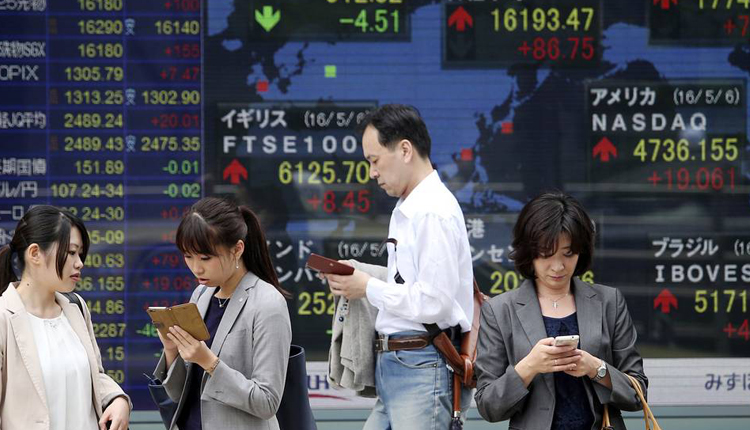Asian stocks slipped in Wednesday afternoon trade following overnight losses on Wall Street that saw the Dow Jones Industrial Average fall more than 200 points.
In Japan, the Nikkei 225 dropped 1.21% in afternoon trade to close at 21,003.37, and the Topix declined 0.94% to 1,536.41. Over in South Korea, the Kospi was down 1.25% to close at 2,023.32, with shares of Samsung Electronics paring some losses to fall 1.76%.
The ASX 200 in Australia shed 0.69% to 6,440.00 as almost all the sectors traded lower.
Mainland Chinese stocks mostly declined by the close, with the Shanghai composite slipping 0.16% to close at 2,914.70, and the Shenzhen component falling 0.28% to 9,010.36. The Shenzhen composite was flat at 1,541.66.
Hong Kong’s Hang Seng index slipped 0.48%, with Hong Kong-listed shares of HSBC and China Construction Bank seeing declines.
Overnight on Wall Street, the Dow had fallen 237.92 points to close at 25,347.77. The S&P 500 also slipped 0.8% to finish its trading day at 2,802.39 while the Nasdaq Composite shed 0.4% to close at 7,607.35.
The yield on the benchmark 10-year Treasury note also dropped to around 2.26%, its lowest level in 19 months. Yields move inversely to prices.
Investors remained cautious, awaiting new developments between Beijing and Washington amid the ongoing trade tensions.
U.S. President Donald Trump said Monday the U.S. was “not ready” to strike a deal with China, before adding he expected one in the future. He also said tariffs on Chinese imports could go up “substantially.”
“I think at this stage, the U.S. feels very comfortable because they don’t see growth really coming off,” Adrian Zuercher, head of asset allocation Asia-Pacific at UBS Chief Investment Office Wealth Management, told CNBC’s “Squawk Box” on Wednesday. “We think actually growth is actually slowing and underneath there’s some cracks, the same on the China side.”
For its part, China appeared to have made a veiled threat concerning rare earth minerals, a crucial component to the U.S. technology industry.
Chinese President Xi Jinping recently visited rare earth mining and processing facilities, adding to speculation that Beijing could make the minerals more expensive or unavailable if the trade war continues to expand.
Shares of rare earth companies soared in Wednesday afternoon trade. In China, shares of JL Mag Rare-Earth skyrocketed around 10% while Innuovo Technology jumped 9.95%. Shares of Lynas in Australia — one of the few rare earth miners outside of China — surged more than 15%.
In currency news, the Trump administration refrained from labeling China as a currency manipulator, but kept the country on a monitoring list along with eight other countries such as Germany, Italy, Japan, South Korea, Malaysia and Singapore.
Following the announcement, many of those currencies continued weakening against the dollar throughout the afternoon. The onshore Chinese yuan last traded at 6.9143, while its offshore counterpart was at 6.9343. The Korean won, which has weakened significantly in 2019 amid economic concerns both abroad and domestically, was at 1,195.35.
The Malaysian ringgit slipped to 4.1970 against the greenback. For its part, the Malaysian central bank said the currency’s exchange rate is market-determined, Reuters reported.
The euro and the Japanese yen were outliers. The euro was marginally higher at $1.1152, while the yen last changed hands at 109.20 against the dollar after seeing levels above 109.5 in the previous session.
The U.S. dollar index, which tracks the greenback against a basket of its peers, was at 97.968 after bouncing from levels below 97.8 yesterday.
Elsewhere, the Australian dollar hovered around $0.6917, just slightly weakened since Tuesday.
Oil prices further deepened losses in the afternoon of Asian trading hours, as the international benchmark Brent crude futures contract fell 1.04% to $69.38 per barrel. U.S. crude futures also declined 1.30% to $58.37 per barrel.
Source: CNBC


